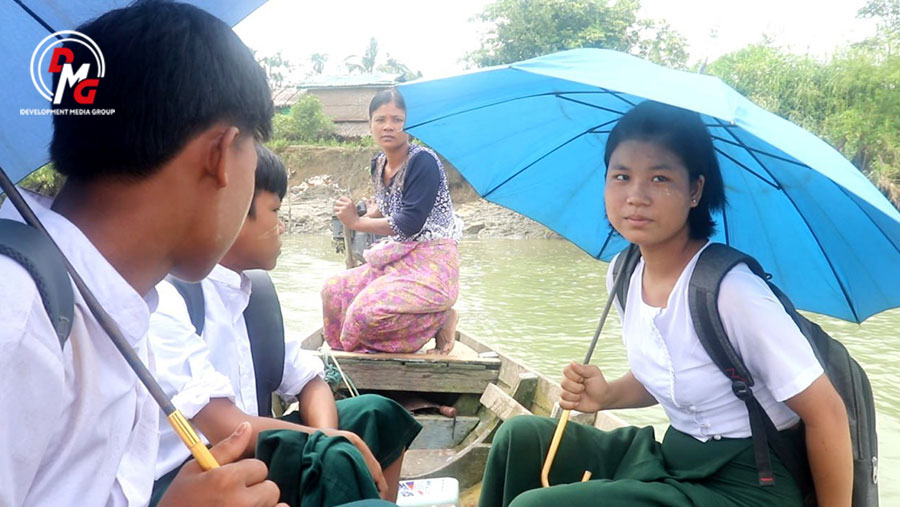- 15 mass casualty incidents from regime airstrikes reported in Arakan State since 2023
- Kyaukphyu IDPs forced to flee again amid junta airstrikes and artillery attacks
- New Diplomatic Movements Between Bangladesh’s New Government and the Arakan Public Administration
- Junta claims over 24 million ballots cast in 2025 poll, cites strong youth turnout
- ULA expands HIV prevention, healthcare services for sex workers in AA-held areas
Students at IDP Camps Risk Life and Limb to Pursue Education
Students in rural parts of coastal Arakan State have no option but to choose water transport for schooling. Boat accidents are not unusual in the state.
29 Nov 2023

Written by Aung Thura
Ma Shwe Ma Phyu, 18, prepares for school most mornings in a state of understandable anxiousness.
Normally and ideally, learning is fun for most students. But for students like Ma Shwe Ma Phyu who live in remote areas, going to the school is no fun. It is a risk.
Waterway is the only mode of transport available in the rainy season. Five days a week, they go to school by boat. Ma Shwe Ma Phyu said she does not feel safe crossing a raging creek in a small motor boat in the rainy season without a lifejacket.
“We have to go by boat from Wah Taung to Kan Sauk. There is no life jacket. So, I get concerned that the boat might capsize,” she said.
Ma Shwe Ma Phyu is a Grade 11 student living at a camp for displaced people in Wah Taung village in Kyauktaw Township. She has nine family members, and is a Mro ethnic from upstream Yoe Creek. They were displaced by the fighting between the Myanmar military and the Arakan Army in December 2018.
At the time, she was just a Grade 6 student. She has been living at the displacement camp for five years now. Wah Taung village only has a basic education primary school.
Around 100 middle and high school students at the village including Ma Shwe Ma Phyu therefore have to study at the basic education high school in Kan Sauk Village, which requires travelling by boat across the Yoe Creek.
Parents are concerned about the safety of their children. Many don’t let their children go to school on days of downpour.
“Parents can relax only after they arrive back home, as boats have no lifejackets. Parents are nervous the whole day,” said U Win Maung, the father of a student from the displacement camp in Wah Taung.
In academic year 2022-23, a motorboat carrying students from Wah Taung capsized after colliding with a passenger boat. Fortunately, no one died in the incident.
Students in rural parts of coastal Arakan State have no option but to choose water transport for schooling. Boat accidents are not unusual in the state.
But this is not the only challenge for an IDP student like Ma Shwe Ma Phyu. There are also challenges in terms of material need and psychological distress.
After the death of her father, who was the main breadwinner for the family, Ma Shwe Ma Phyu and her family were bitterly affected by the economic headwinds they faced.
“When my father was alive, I was able to buy books. My mother can’t work anymore. I can’t pay tuition fees regularly. There was no light for me to read at night, so I took the light from my grandfather’s home. I have many difficulties to continue my education,” said Ma Shwe Ma Phyu.
Ma Shwe Ma Phyu’s father died of kidney cancer in May 2023 while fleeing the war. Since then, the 52-year-old mother has been taking care of her children’s livelihood, health, and education.
Ma Shwe Ma Phyu’s mother, Daw Ma Nu Chay, said that there are many difficulties for a widow who struggles alone to provide for her family’s livelihood and children’s education.
“We now rely on food and cash assistance donated by the local charities and World Food Programme (WFP). I am getting old and I can’t work anymore,” she said.
Even prior to the latest rekindling of hostilities between the Myanmar military and Arakan Army, about 2,000 ethnic Mro IDPs in the upper reaches of the Yoe Creek had not been able to return home for five years.
The ethnic Mro IDPs are provided with K30,000 each by the WFP, and most make a living as odd-job workers.
There are more than 100 students at the Wah Taung IDP camp. Of them, about 50 students have to go to a school by crossing the Yoe Creek in boats.
Ma Shwe Ma Phyu, an IDP student who is studying hard from the displacement camp, said that she wants to become a schoolteacher in order to improve the education standards of the Yoe Creek area.
“I want to be a schoolteacher and support my parents,” she said. “I want my younger sisters and children in my village to be educated.”








.jpg)











